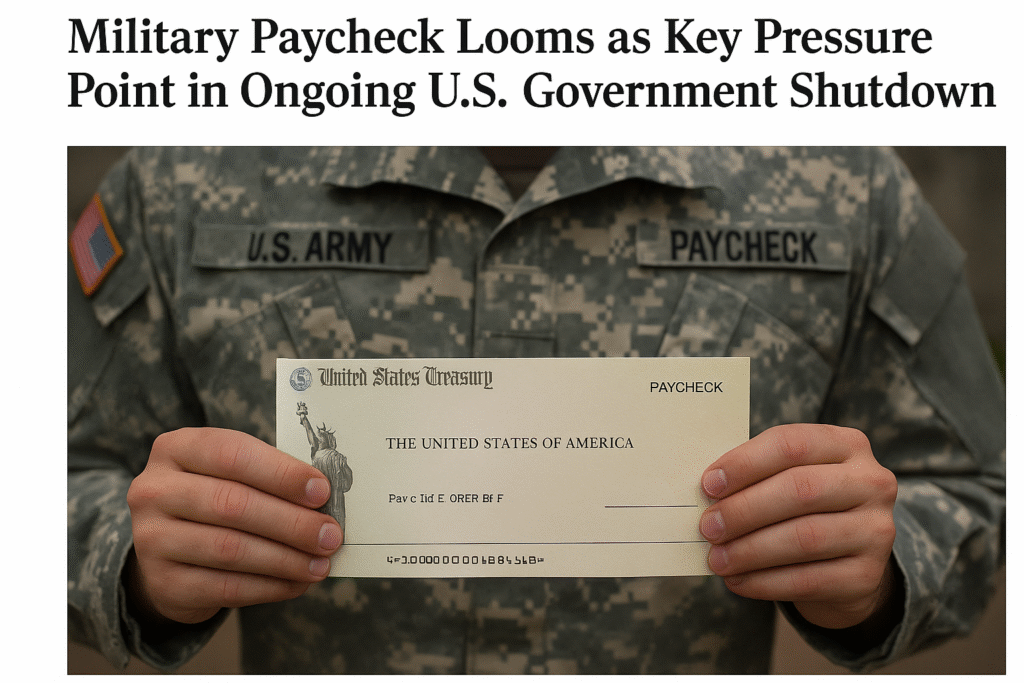By Harshit | October 7, 2025 | Washington
WASHINGTON — The U.S. government shutdown entered its second week on Tuesday, showing little sign of resolution. But an approaching deadline for military paychecks is emerging as a potential game-changer in the standoff between Congress and the White House. Analysts warn that the Oct. 15 payroll date, when salaries for 1.3 million active-duty service members are due, could prove to be the key “forcing event” that breaks the deadlock.
Military Pay as a “Forcing Event”
Economists at Goldman Sachs, Ronnie Walker and Alec Phillips, emphasized the significance of the military payroll in a client note. “We believe the military pay date on Oct. 15 could be an important forcing event for a compromise to restore funding and expect the shutdown to end by mid-October,” they wrote.
Prediction markets, however, tell a more skeptical story. On Polymarket, the odds currently suggest a 71% probability that the shutdown will last beyond Oct. 14, highlighting widespread doubt that lawmakers will resolve the crisis quickly.
Political and Public Pressure
The potential delay in paying U.S. troops is not only a financial risk but also a political one. Lawmakers face the possibility of severe public backlash if service members and their families are left without pay. That pressure could be enough to force Congress to adopt at least a short-term continuing resolution — a temporary measure to keep the government funded while negotiations drag on.
However, some analysts note that the Department of Defense could attempt to find stopgap measures to cover payroll, or Congress could pass a narrow funding bill to ensure troops are paid. Either option might reduce the urgency for a comprehensive deal, extending the broader shutdown.
Wider Fallout of the Shutdown
While military pay dominates headlines, the ripple effects of the government shutdown are already being felt across the country. The closure has delayed the release of key economic data, such as the September jobs report, which policymakers and investors rely on to assess the health of the U.S. economy.
Other disruptions are becoming increasingly visible:
- Airport delays: If more TSA agents stop reporting to work, longer lines and flight delays are likely.
- Suspended services: Many government offices remain shuttered, leaving citizens without access to federal programs.
- Economic uncertainty: Families of federal workers face delayed mortgage payments and stalled benefits, fueling frustration and weakening consumer confidence.
Ed Mills, a Washington policy analyst at Raymond James, said that “concerns over military pay, TSA operations, or delayed mortgage payments for service members could become catalysts for compromise.”
Upcoming Deadlines Add Pressure
Beyond the military payroll, several other key dates loom large and could intensify pressure on lawmakers:
- Oct. 13: Expiration of Women, Infants, and Children (WIC) nutrition benefits, affecting low-income families.
- Nov. 1: Launch of open enrollment for the Affordable Care Act, critical for millions of Americans.
- Nov. 21: Congressional recess for Thanksgiving, coinciding with one of the busiest travel seasons of the year.
Analysts caution that these upcoming deadlines, particularly the WIC expiration, could escalate public anger if left unresolved. Pimco, a global investment firm, warned, “Shutdowns are easy, but reopenings are harder, and this one — the first full shutdown since 2013 — seems particularly intractable, at least for now.”
Market and Economic Repercussions
The shutdown is also rattling financial markets. Investors are worried about delayed economic reports, which make it harder to gauge the Federal Reserve’s path on interest rates. The uncertainty could slow investment decisions and rattle business confidence.
For Wall Street, the immediate concern is the lack of visibility. Without jobs and inflation data, the Fed may be forced to act cautiously in its next policy meeting, potentially keeping interest rates higher for longer. That, in turn, could weigh on stocks already volatile from political drama in Washington.
Outlook
The Senate has scheduled a vote for Monday evening, but expectations remain low. President Donald Trump has warned that temporary layoffs caused by the funding lapse could become permanent if Congress fails to reach a deal.
With pressure mounting, the looming deadline for military pay may prove to be the most immediate test of Washington’s political will. If lawmakers allow the crisis to stretch past Oct. 15, they risk not only angering military families but also deepening public frustration at a government unable to function.
For now, the U.S. government shutdown continues into its second week, with the fate of military pay standing out as the clearest signal of whether compromise is near — or still a distant hope.

